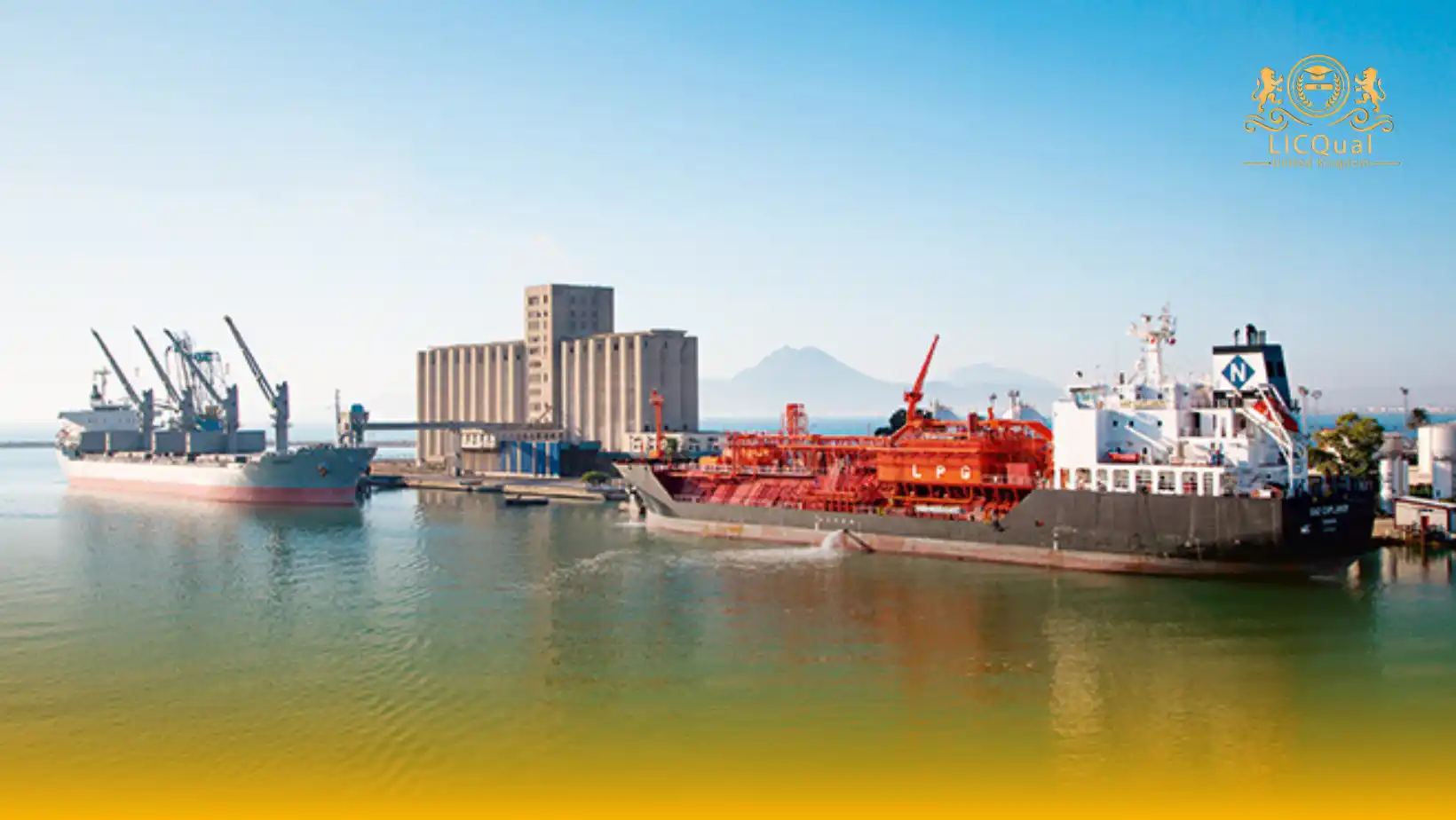The LICQual UK Level 3 Diploma in Shipping Finance is a UK accredited qualification designed to give professionals and career changers a strong foundation in maritime and financial principles. This program introduces learners to the essential concepts of shipping finance, trade documentation, marine insurance, and cost management, making it an ideal pathway for those looking to build expertise in the global shipping and logistics industry.
Shipping finance plays a critical role in international trade, connecting ports, shipping companies, and financial institutions that keep global commerce moving. The Level 3 Diploma in Shipping Finance UK provides learners with practical knowledge of accounting, operational costs, and trade finance, while also covering the fundamentals of risk management and marine insurance. By mastering these areas, learners gain the confidence to support financial decision‑making in shipping companies, freight forwarding firms, and logistics organizations.
Delivered through flexible online study, this internationally recognized diploma is designed to fit around professional commitments. Learners benefit from a curriculum aligned with international standards, ensuring that the qualification is valued across the maritime and trade finance sectors. The program emphasizes real‑world application, helping participants understand how financial principles directly impact shipping operations, cargo handling, and global supply chains.
What makes this course stand out is its balance of theory and practice. From learning how to prepare financial reports for shipping companies to understanding trade finance instruments like letters of credit and bills of lading, every unit is designed to provide skills that can be applied immediately in the workplace. The diploma also introduces learners to professional communication in shipping finance, ensuring they can interact effectively with clients, insurers, and trade partners.
By completing the LICQual UK Level 3 Diploma in Shipping Finance, learners position themselves for career growth in maritime finance, logistics, and international trade. This qualification offers a clear pathway to professional development, industry recognition, and future progression into advanced studies or senior roles.
Course Overview
Qualification Title
LICQual UK Level 3 Diploma in Shipping Finance
Total Units
6
Total Credits
60
GLH
240
Qualification #
LICQ2201309
Qualification Specification
To enroll in the LICQual UK Level 3 Diploma in Shipping Finance, applicants must meet the following criteria:
|
Qualification# |
Unit Title |
Credits |
GLH |
|---|---|---|---|
|
LICQ2201309-1 |
Introduction to Shipping and Maritime Finance |
10 |
40 |
|
LICQ2201309-2 |
Principles of Accounting in Shipping |
10 |
40 |
|
LICQ2201309-3 |
Shipping Operations and Cost Management |
10 |
40 |
|
LICQ2201309-4 |
Marine Insurance and Risk Fundamentals |
10 |
40 |
|
LICQ2201309-5 |
Trade Finance and Documentation in Shipping |
10 |
40 |
|
LICQ2201309-6 |
Professional Communication in Shipping Finance |
10 |
40 |
By the end of this course, learners will be able to:
Unit 1: Introduction to Shipping and Maritime Finance
By the end of this unit, learners will be able to:
- Explain the role of shipping finance in global trade and maritime operations.
- Identify key stakeholders in shipping and their financial responsibilities.
- Demonstrate understanding of basic financial structures in the shipping industry.
- Apply fundamental concepts of shipping finance to real‑world scenarios.
- Evaluate the importance of shipping finance in supporting international commerce.
- Recognize how shipping finance links to logistics, ports, and supply chains.
Unit 2: Principles of Accounting in Shipping
By the end of this unit, learners will be able to:
- Apply basic accounting principles to shipping and maritime businesses.
- Prepare simple financial statements relevant to shipping operations.
- Demonstrate knowledge of bookkeeping, ledgers, and cost allocation.
- Analyze financial data to support decision‑making in shipping companies.
- Evaluate the importance of accurate accounting in maritime finance.
- Recognize compliance requirements in financial reporting for shipping firms.
Unit 3: Shipping Operations and Cost Management
By the end of this unit, learners will be able to:
- Identify the main cost components in shipping operations.
- Apply cost management techniques to improve operational efficiency.
- Demonstrate understanding of voyage expenses, port charges, and fuel costs.
- Evaluate the impact of cost control on profitability in shipping finance.
- Recommend strategies to optimize resource use in shipping operations.
- Recognize the role of cost analysis in competitive maritime markets.
Unit 4: Marine Insurance and Risk Fundamentals
By the end of this unit, learners will be able to:
- Explain the principles of marine insurance and its role in shipping finance.
- Identify different types of marine insurance policies and coverage.
- Apply risk assessment techniques to shipping operations.
- Demonstrate knowledge of claims handling and settlement procedures.
- Evaluate the importance of insurance in protecting shipping assets and cargo.
- Recognize international conventions that govern marine insurance practices.
Unit 5: Trade Finance and Documentation in Shipping
By the end of this unit, learners will be able to:
- Explain the role of trade finance in international shipping transactions.
- Demonstrate knowledge of key documents such as bills of lading and letters of credit.
- Apply trade finance instruments to support shipping operations.
- Evaluate the importance of accurate documentation in global trade compliance.
- Recognize risks in trade finance and recommend preventive measures.
- Strengthen understanding of financial flows in shipping and logistics.
Unit 6: Professional Communication in Shipping Finance
By the end of this unit, learners will be able to:
- Demonstrate effective communication with clients, insurers, and trade partners.
- Apply professional writing skills to financial and shipping documentation.
- Use negotiation and problem‑solving skills in shipping finance contexts.
- Evaluate the importance of cultural awareness in international communication.
- Develop strategies to build trust and credibility in maritime finance.
- Recognize the role of communication in supporting financial decision‑making.
The LICQual UK Level 3 Diploma in Shipping Finance is designed for professionals who want to strengthen their knowledge of maritime finance, trade documentation, and shipping operations. It is particularly valuable for individuals already working in logistics, shipping, or finance who want to expand their expertise, as well as career changers seeking to transition into the global shipping and trade finance sector. This qualification provides practical, workplace‑ready skills that can be applied immediately in professional roles.
Shipping and Logistics Professionals
- Gain a strong foundation in shipping finance to complement logistics expertise.
- Understand trade finance, documentation, and cargo cost management.
- Strengthen decision‑making in supply chain and distribution networks.
- Improve efficiency in shipping operations and financial reporting.
- Enhance career prospects in international logistics and maritime trade.
Port and Maritime Staff Advancing Careers
- Build structured knowledge of shipping finance and operations.
- Learn best practices in cost management and marine insurance.
- Strengthen financial skills for supervisory or management roles.
- Improve communication with shipping companies and trade partners.
- Position yourself for leadership opportunities in maritime finance.
Trade Finance and Banking Professionals
- Understand the financial instruments used in global shipping transactions.
- Strengthen knowledge of letters of credit, bills of lading, and compliance.
- Improve coordination between banks, insurers, and shipping companies.
- Apply international standards to trade finance operations.
- Enhance credibility in global trade and financial services.
Marine Insurance and Risk Officers
- Apply insurance principles to protect shipping assets and cargo.
- Strengthen risk assessment and claims handling skills.
- Promote compliance with international marine insurance frameworks.
- Manage liability and risk exposure in shipping operations.
- Enhance professional standing in insurance and risk management.
Customer Service and Operations Coordinators
- Develop strong communication skills for shipping and finance stakeholders.
- Apply customer service principles to improve client satisfaction.
- Resolve operational and financial issues through negotiation.
- Strengthen cultural awareness in international trade interactions.
- Build long‑term relationships with clients and partners.
Career Changers Entering Shipping Finance
- Transition into the maritime and finance sector with a UK accredited qualification.
- Gain practical knowledge of shipping operations, finance, and documentation.
- Build confidence in applying international standards to real‑world roles.
- Strengthen employability in shipping, logistics, and trade finance.
- Position yourself for new career opportunities in global commerce.
Assessment and Verification
All units within this qualification are subject to internal assessment by the approved centre and external verification by LICQual. The qualification follows a criterion-referenced assessment approach, ensuring that learners meet all specified learning outcomes.
To achieve a ‘Pass’ in any unit, learners must provide valid, sufficient, and authentic evidence demonstrating their attainment of all learning outcomes and compliance with the prescribed assessment criteria. The Assessor is responsible for evaluating the evidence and determining whether the learner has successfully met the required standards.
Assessors must maintain a clear and comprehensive audit trail, documenting the basis for their assessment decisions to ensure transparency, consistency, and compliance with quality assurance requirements.







